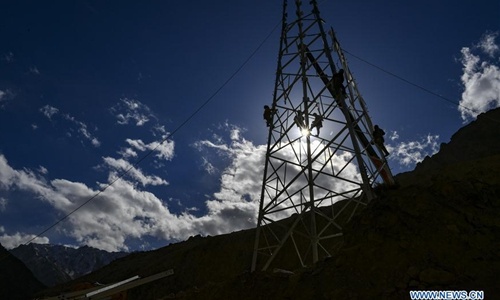
Technicians work on an electric transmission tower in Maryang township, Tajik Autonomous county of Taxkorgan, Northwest China's Xinjiang Uygur Autonomous Region, Nov 23, 2019. (Photo: Xinhua)
Local governments in China are stepping harder on the pedal to push through a series of infrastructure investment projects worth as much as nearly $5 trillion so far, offering some much-needed relief for the economy, which is under severe pressure from the coronavirus epidemic, but also raising alarms over efficiency and potential risks of an investment spree.
While the large-scale, mostly government-led infrastructure projects could be effective in propelling China's economic growth and generating new jobs, they are only a short-term fix that could bring more risks than solutions, if not properly executed, analysts said. Local governments need a coordinated, targeted approach and refrain from blindly pursuing numbers, the analysts urged.
Investment spree
As of Sunday, nine provinces in China including North China's Hebei Province and East China's Fujian Province have reportedly rolled out investment plans worth 33.83 trillion yuan ($4.86 trillion) in total. Majority of the capital would be channeled to transportation, infrastructure and manufacturing.
Some of these projects are already on the way to implementation. Last week, China Three Gorges Corp announced it was kick-starting 25 new-energy projects with an input of 58 billion yuan ($8.27 billion) in total. The construction of a high-speed railway linking Zhengzhou, capital of Central China's Henan Province and Jinan, capital of East China's Shandong Province, also started on February 27, according to media reports.
The news presented promising indication that more construction projects are resuming work as the epidemic is increasingly under control. More importantly, the infrastructure projects could also offer some boost to the Chinese economy, which is expected to slow down significantly due to the epidemic, analysts said.
"Compared with monetary policies, expanding infrastructure investment is an effective way to cope with external shocks like financial crises and of course, the coronavirus. It can help economy revert back to a normal state," Chen Run, an economist at the Institute of Economic System and Management under the National Development and Reform Commission, told the Global Times.
While growth in China is increasingly driven by consumption, investment still contributes a big chuck to growth. In 2019, consumption accounted for 57.8 percent of GDP growth, while investment contributed 31.2 percent and export accounted for 11 percent.
"The implementation of this round of infrastructure investment would play a 'huge' role in cushioning an economic tumble triggered by the epidemic. With targeted investment stimulus, China's economy can still achieve above 6 percent growth this year and continue to be an important driver of global economic growth and anchor of global markets," Chinese economist Song Qinghui told the Global Times.
Apart from their role in boosting economic growth, infrastructure projects could also pull up a series of industries in upstream and downstream areas such as machinery and construction material and generate jobs growth, analysts and industry insiders said.
"The government's emphasis on infrastructure projects is undoubtedly a bonus for our industry. We look forward to it," Li Hongbao, an excavator industry observer, told the Global Times on Tuesday, noting that the rate of utilization for excavators has climbed to about 30 percent from a low point of 10 percent in China.
The benefit of China's infrastructure projects could also be felt by foreign companies. "Such demand allows foreign companies to explore opportunities in the Chinese market with great potential," Yin Naxin, marketing director of ADP Ingénierie China, told the Global Times, adding that the epidemic will not change the company's strategy for China.
Number overblown
However, the announcement of the projects has also raised questions whether China is resorting to massive infrastructure spending to jumpstart economic growth and triggered concerns over potential risks of rising local government debt.
Although such risks could exist, the latest infrastructure projects are not aimed at boosting economic growth but instead are based on multi-year development plans based on organic demand for the infrastructure, according to analysts.
"The intensity of the investment is not as excessive as some media outlets have suggested," he said, noting that growth in infrastructure spending will not see a sharp increase from last year. Chen said fixed-asset investment will likely grow between 6.5 percent and 7 percent this year, compared to a 5.4 percent growth in 2019.
Chinese officials have also repeatedly vowed that they would not resort to old playbooks including infrastructure spending and property to jumpstart economy. The People's Bank of China, the central bank, said that it would not open the "floodgate" of stimulus to prop up growth, but instead rely on a combination of monetary and fiscal policies to cope with the economic fallout of the epidemic.
"I think governments should consider their ability and not blindly pursue the number of projects when making investment plans," Tian Yun, vice director of the Beijing Economic Operation Association, told the Global Times, noting that the demand, costs and environmental implications should be fully accessed.
A coordinated national approach should also be adopted in planning for infrastructure projects, where more developed areas in the east coast should pursue projects for new technology-based projects, such as 5G networks, while less developed central and western areas should focus on more infrastructure projects, analysts said. Increase in projects in healthcare and biomedical sectors is also necessary as the epidemic has shown, they added.
Recent investment plans from the central government which reportedly could amount to 3.5 trillion yuan over the next five years have also focused on new areas such as public heath, essential supplies, 5G network and digital centers.
"Using investment to boost economic growth is no longer suitable to the realities of China's economic developments," Chen said.


